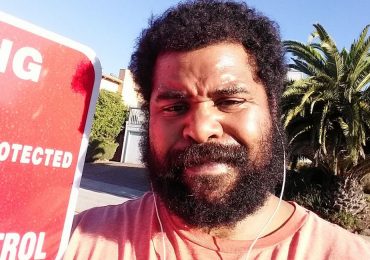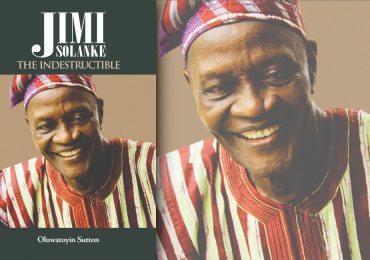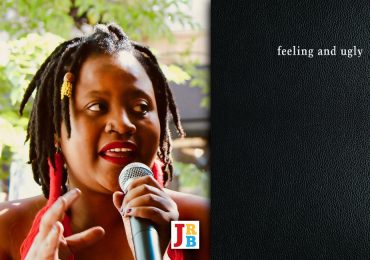Once one experiences the phenomenal power of Christopher Okigbo’s poetry, it seems the reverberations persist throughout one’s creative life, writes Sanya Osha.
Christopher Okigbo met his untimely demise during the Nigerian Civil War in 1967, at the age of thirty-five. He had attended the then-University College Ibadan, where the late Harry Garuba also studied and worked. During the early nineteen-eighties, Garuba and a few fellow poets and friends founded the legendary University of Ibadan (UI) Poetry Club. At these gatherings, budding poets could receive critical feedback on their work, and participants often formed lifelong bonds. Garuba served as the fulcrum of this ever-evolving roster of creatives, by volunteering space in his book-cluttered office, his table in the student union, where he drank nightly, or his warm and cosy apartment on Phillipson Road, at the far end of campus.
(Recently, together with a couple of colleagues at the University of Cape Town, we reissued Garuba’s seminal poetry collection, Shadow and Dream and Other Poems, first published in 1982.)
The highlight of the Poetry Club’s creative calendar was Okigbo Night, an event marked by varying degrees of solemnity, hilarity and sometimes drunken intensity. There were readings, performance art and, as the grand finale, a poetry competition. This was one of the ways in which Okigbo was canonised at Ibadan. Okigbo had worked in Ibadan for a while, as the West African representative of Cambridge University Press. And during his time at Ibadan, both as a student and as a publisher, he made an indelible impact on many of his friends, including the recently deceased poet and scholar John Pepper Clark-Bekederemo (who died in late 2020), the novelist Chinua Achebe, the playwright Wole Soyinka, artist and architect Demas Nwoko, and younger pals such as the playwright and poet Femi Osofisan.
Osofisan often tells the story of the night when he witnessed Okigbo at work. After hours of toil, Osofisan had fallen asleep. Much later, he woke up to find Okigbo still grinding away, with piles of discarded paper lying around. When he asked what Okigbo had produced in all that time, Okigbo proffered a mere four lines, but, as he tells it, they were rare and sublime. Osofisan was fascinated by this moment of sublimation and unremitting fastidiousness. This was obviously more than just a case of a legendary master of the poetic form adhering to the exacting demands of his craft.
Labyrinths, Okigbo’s sole collection of poetry, became the holy grail for many Ibadan and Nigerian poets. His voice and vision were unique and unmistakable, and many poets have tried to emulate his lofty register, often with ludicrous results. Okigbo was a cultural pathfinder, a purveyor of intricate and interwoven emotions, a fearsome cosmonaut of vast celestial spheres, earnestly seeking the music of newly resurrected gods of artistry. His creative quest bristled with unparalleled ambition and ingenuity, and the single-mindedness with which he embarked on his journey continues to inspire legions of poets.
What makes Okigbo’s achievement especially awe-inspiring is that his life and work remain shrouded in mystery. Garuba and many others, such Obi Nwakanma, Okigbo’s biographer and currently professor of literature at the University of Central Florida, understood and appreciated this profound sense of enigma. In the early nineteen-nineties, when Nwakanma began his research on Okigbo’s life and work—which was eventually published in 2010 as Christopher Okigbo 1930–1967: Thirsting for Sunlight—I would sometimes go with him on field trips. I recall one memorable visit to Alex Olu Ajayi’s residence in suburban Lagos. Ajayi, a retired top-level public servant and Okigbo’s friend, regaled us with tales of the late poet’s days at Fiditi Grammar School in western Nigeria, where he had taught Greek and Latin. There we were, two young aspiring poets, quaffing lukewarm bottles of beer on a hot, humid, mosquito-filled night, dishing out incessant questions about a long dead poet to a retired public servant who just wanted to enjoy his remaining days in peace with his young wife. Clearly, Ajayi wasn’t as besotted with Okigbo as we were; he’d seen too much not to possess a healthy dose of cynicism. He humanised Okigbo, bringing him right back down to earth as any weathered elder would.
On the other hand, young as we were, we needed romantic and somewhat inaccessible heroes to alleviate the banality of existence, to distract us from the fact that much of humanity is extraordinarily mundane and perhaps also, for the most part, existentially unbearable.
Nwakanma and I would also visit the residence of the late Bola Ige, politician, lawyer, good friend of Soyinka and classics graduate of the University College Ibadan, for more stories on Okigbo. Ige was a former attorney-general and Federal Minister of Justice, and he was gunned down under mysterious circumstances at his Ibadan residence in 2001.
Nwakanma was dogged in his pursuit of traces of Okigbo wherever they might be, and his strenuous efforts eventually paid off. Incidentally, he had not been a student of UI—where Okigbo is immensely revered—but the University of Jos in the Nigerian middle belt. And so, quite surprisingly, Okigbo’s pre-eminent biographer emerged from outside his original circle of influence.
Okigbo has also been immortalised by Chinua Achebe, who co-edited an anthology of poetry in his honour ten years after his death. The Structuralist scholar Sunday Anozie subjected Okigbo’s work to largely impenetrable critical scrutiny, and the Anglo–Nigerian writer Adewale Maja-Pearce edited a collection of his poetry for Heinemann London.
And so when I had to write my foreword to a new edition of Garuba’s Shadow and Dream, there was no way I could avoid Okigbo’s long shadow. I titled my piece: ‘Harry Garuba: A Priest at Christopher Okigbo’s Shrine’.
Then someone in London sent me an audio recording of an interview with Okigbo conducted in 1966 by the Ugandan playwright Robert Serumaga. Before that, the only image of Okigbo I had in my mind was of him studiously puffing on a pipe, like the true artist he was. His voice is distinctly Nigerian with a slight eastern region twang. In his views, he is as polemical, paradoxical and elliptical as any great poet would be. Okigbo’s utterances embrace indigenous African spiritualities, a modernist temperament, a beguiling cosmopolitanism and a fiercely individualistic outlook curiously mediated by an underlying communalist ethos. He is Nigerian, African and a citizen of the world all at once, and he isn’t afraid to contradict himself, in the manner that visionary Senegalese filmmaker Djibril Diop Mambéty would sometimes do. There is always an element of mystery and contradiction in great poetic spirits; they all seem to deeply appreciate notions of complexity and the kaleidoscopic dimensions of existence.
The tone and patterns of his speech were also somewhat surprising. There is a transcendent quality to his poetry that hardly ever falters, and yet his actual voice has a slightly harried flow, inflected by a youthful rush to get his point across, as one might be when haggling over prices at some boisterous African market.
Okigbo’s cultural eclecticism, which would be akin to today’s Afropolitanism, stemmed from a number of factors. He was well versed in Greek and Latin and adored classical European literature. He also saw himself as a descendant of the ancient spiritual forebears of the eastern part of the country, a modern-day custodian of a way of being characterised by constant communion with one’s ancestors and natural elements, such as rivers, wind and the earth. His poetry is often a solemn invocation of spirits for guidance and edification. At other times it is a lyrical celebration of the French classical composer Claude Debussy, whom he also loved dearly. Spare passages of Okigbo’s poetry unmistakably encapsulate Debussy’s haunting sonic frequencies. These various cultural influences and art forms were fused to forge Okigbo’s distinctive creative template, which remains unique in the realm of modern African literature.
By paying solemn homage to Idoto, a marine goddess worshipped by the indigenous people of Ojoto in eastern Nigeria, Okigbo inherited a sacred ancestral spirit that bound him irrevocably to his ethnic community. But his worldly trajectory provided him with another set of inheritances that led to explorations that opened up his mind to Greco-Roman civilisation, European classical music and literature, and other artistic products of world culture. The rustic wayfarer became a denizen of the world who never failed to invoke and celebrate the powers and mysteries of the streams of his childhood.
Okigbo’s vision, sensibilities and influence endured and thrived after his tragic death. People like Garuba and Nwakanma have carried his torch for all to see. Indeed, great visions don’t die but are revived in the hearts and minds of numerous initiates and countless spaces that appreciate the importance of true and unfettered creativity.
In many ways, Okigbo remains an enigma. To further unravel the mysteries surrounding this fascinating poet, I spoke to Nwakanma, his biographer.
Sanya Osha for The JRB: What do you consider to be the reasons for Okigbo’s enduring influence on modern Nigerian literature?
Obi Nwakanma: Okigbo’s poetry has a haunting music. Its lyrical force compels you to listen, whether or not you understand the intricate, but quite ordinary, meaning he created. That haunting music has a lingering power, and that is the key to his impact. He was a very careful craftsman, for whom poetry was the unity of movement and logic—what he himself described as ‘logistics’. Moreover, his death—very early, like Lord Byron’s—nurtured him in the clay of time, and preserved him as an eternal youth. The myth of his poetry—of the Orphic traveller, and of the anguished, torn poet, seeking meaning and reconciliation with the goddess of the land—was heightened by the intense and tragic drama of his end: ‘O mother mother earth, unbind me; let this be my last testament …’ Such clear invocatory power, that subdued acceptance of his inevitable self-sacrifice, has ensured the enduring impact of Okigbo.
The JRB: What role did he play within the Osogbo and Ibadan-based Mbari Club artistic collective?
Obi Nwakanma: He was a founding member of Mbari. He was, quite significantly, the editor of Mbari Publications, the publishing arm of the Mbari Club in Ibadan.
The JRB: Okigbo’s charisma must have had an effect among his friends and literary peers, which included Achebe, JP Clark and Soyinka?
Obi Nwakanma: These were characteristically private, individual geniuses. Some of them, like Clark, were volatile, easily triggered and short-fused. Achebe was calm and withdrawn but capable of biting wit. Soyinka was hyper-individualistic; restless and constantly mobile. Coming and going in all kinds of strange disappearing acts. Okigbo, according to many accounts, was also sometimes given to intense moments of self-withdrawal and silence. It was not unusual to come to Cambridge House, where he lived in Ibadan, to the echo of silence, with Okigbo inside but taciturn. Yet, he was also, of all of them, the one most connected with all of his peers. He had a dramatic personality. A charm that made him easy to bear. As his friend, the critic Ben Obumselu, said, ‘Christopher was everybody’s friend.’ He had a careless generosity. He apparently radiated an openness that made him very welcoming. He ran an open house. His residence in Cambridge House was a place of gathering—from his special palm wine vintner from Ede, to Professor Kenneth Dike, the powerful Vice Chancellor of the University of Ibadan. All were welcome and found easy camaraderie in Okigbo’s house. Many of his peers found Okigbo endearing—as someone who had little time for long grudges. But he was also capable of mischief, and of what Obumselu called the ‘gentleman’s dissipation’. He was a real prodigal.
- Sanya Osha is the author of several books including Postethnophilosophy (2011), a work of philosophy; two novels, Dust, Spittle and Wind (2011) and An Underground Colony of Summer Bees (2012); and Ken Saro-Wiwa’s Shadow (Expanded Edition) (2021), an academic study; among other publications. He works at the Institute for Humanities in Africa (HUMA), University of Cape Town.





